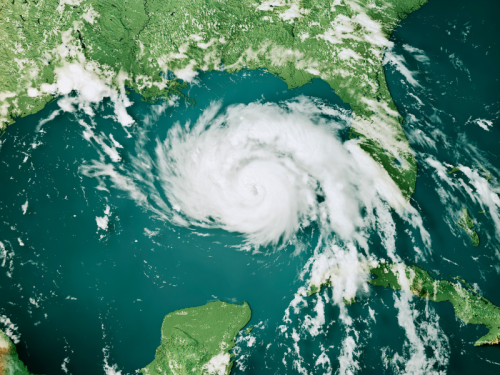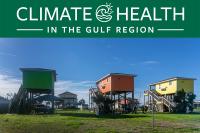
No matter what your thoughts are on climate disruption, the fact is that weather extremes play a significant role in human health. The effects of extreme weather include damage to homes, increased air pollution, water and food insecurity, and more frequent severe weather events like droughts, hurricanes, and wildfires. These impacts are more pronounced in areas like New Orleans and the Gulf Coast, low-lying island nations in the Pacific Ocean, and lower-income countries in Africa, all regions highly vulnerable to climate-related risks.
In addition, these regions already face health disparities and barriers to access, which are only exacerbated by the effects of climate change. The Gulf Coast experiences higher rates of poverty and adverse health outcomes, with many unable to afford healthcare. According to Dr. Melissa Gonzales, faculty in the Department of Environmental Health Sciences, climate change-related public health challenges will only intensify in the coming years. She points to more frequent flash floods and rising temperatures that strain public health resources, particularly in marginalized communities.
Dr. Mostafijur Rahman, an assistant professor in her department, specializes in using longitudinal data to understand the effects of environmental exposures on health. Rahman’s research in Bangladesh and California revealed the dangerous health outcomes associated with air pollution, extreme heat, and temperature variability, including respiratory and cardiovascular issues.
Rahman’s work highlights the importance of understanding the specific needs of affected communities. "It is very important to talk to the community to get their real-life experience," he says, as this helps shape strategies tailored to local realities. The goal is to develop interventions that reduce vulnerability and increase resilience, particularly for marginalized populations who bear the brunt of climate change’s health impacts.
Another dangerous effect of climate change is the increase in wildfires, which pose risks both from the fires themselves and the air pollution they generate. Dr. Felicia Rabito, a Tulane epidemiologist who researches residential-based exposures and their effects on asthmatic children, highlights the risks associated with smoke inhalation, particularly from the release of carbon particles, which can impact the cardiorespiratory system, especially for those with pre-existing conditions, the young, and the elderly. She emphasizes the importance of community education in crisis situations, such as advising people to stay indoors during wildfire events.
Dean Thomas A. LaVeist has made climate change and health a strategic priority for Tulane, underscoring that Louisiana’s vulnerability foreshadows broader national impacts. “Climate change is an existential threat to humanity, and Louisiana is one of the most fragile places on the planet,” says LaVeist. “We foreshadow what can be expected in other parts of the country, and the threat is amplified by the grave health inequities experienced throughout the Gulf South.”
Dr. Rahman emphasizes that interdisciplinary collaboration is essential for creating sustainable solutions. While fields like engineering and architecture can contribute to mitigating climate impacts through urban design [https://architecture.tulane.edu/climate], the primary focus remains on protecting public health. "We cannot do it alone," he notes, stressing the importance of widespread buy-in as climate change becomes increasingly unavoidable.
One critical factor motivating change is the financial impact of climate change. Rising insurance costs offer tangible evidence of the increasing risks, particularly in areas like the Gulf Coast, where insurance premiums are climbing.



